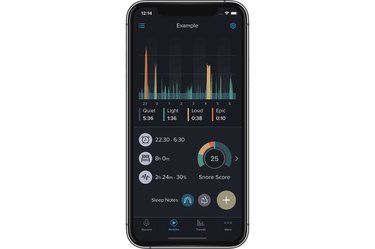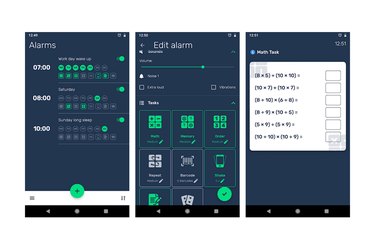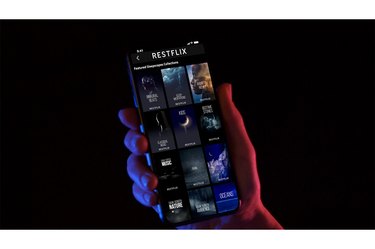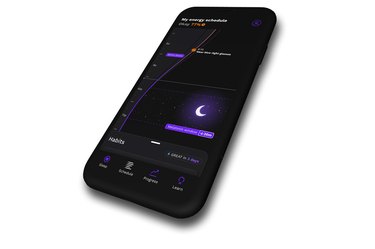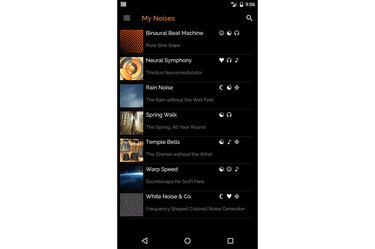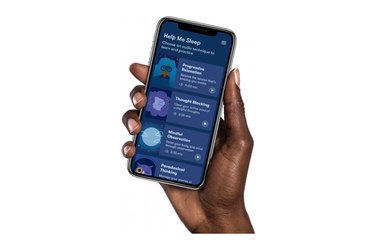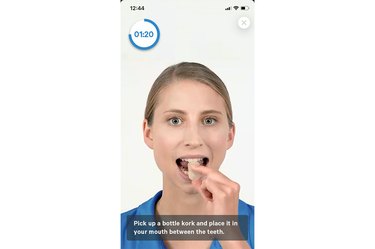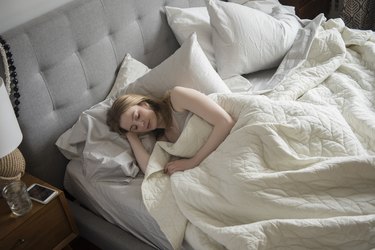
Having trouble sleeping lately? Join the club. In a May 2020 survey from SleepStandards, 98 percent of people reported experiencing new sleep problems since the novel coronavirus pandemic, thanks to anxiety, insomnia, loneliness, nightmares and an inconsistent schedule.
And that's unfortunate, because getting seven to nine hours of shut-eye a night is associated with tons of amazing health benefits. Chief among them, according to the National Sleep Foundation, is improved immunity, which we could all use an extra boost of right now.
Video of the Day
Video of the Day
The good news: There's an app for that. It turns out your phone can be a portal to all kinds of slumber-enhancing tools, from reducing snoring to overcoming insomnia. We asked the experts to divulge their favorite mobile sleep apps that actually work to score you better zzzs.
Wait, Aren't Phones Bad for Sleep?
Typically, sleep experts don't recommend using phones in the bedroom. That's because all those email pings, news alerts and social media updates are mentally stimulating, per the National Sleep Foundation, making it hard for your brain to wind down so you can drift off.
The other big reason to avoid phones in the bedroom is because the blue light emitted by tech devices suppresses the production of melatonin, disrupting your circadian rhythm.
But with these apps, you can make an exception to the "no phones" rule. That's because while you will need to bring your phone into the bedroom, you won't need to interact with it before bedtime to get the benefits of these apps that promote better shut-eye.
1. Best for Snoring: SnoreLab
If your room turns into a snorechestra at night, then this app's for you. Place your phone next to your bed and SnoreLab will track your snoring during the night and then plot the results on a graph. The next morning, you can check out the duration, frequency and volume of your snorts and puffs.
Another useful feature: SnoreLab records samples of you sawing logs.
"Showing your doctor these audio files can help them diagnose potential sleep apnea and develop a treatment plan to improve your sleep," says neurologist and sleep specialist Chris Winter, MD, author of The Sleep Solution.
According to the American Sleep Association, monitoring your snoring also lets you assess the effectiveness of snore reduction strategies, like nasal strips or a body pillow. One SnoreLab feature allows users to test whether remedies are working by comparing your snoring over time; another measures the impact of factors like alcohol or medication on your respiration.
Download it: SnoreLab.com
2. Best if You Often Oversleep: I Can’t Wake Up!
An October 2019 survey from Mattress Inquirer found that 57 percent of people oversleep at least once a week, the top reasons being that they snoozed right through their alarm or absentmindedly turned it off. Not only can running late throw off your whole day, but anxiety about not waking up on time might give you insomnia the night before. That, of course, only makes you more likely to oversleep.
If that sounds familiar, then you might benefits from the alarm clock app I Can't Wake Up.
"To turn off your alarm, this app creates a task that's more complicated than swiping your finger," Dr. Winter says.
In order to prevent you from oversleeping, your phone will keep buzzing until you complete a challenge. Depending on your settings, you might have to solve math problems, play a matching or memory game, rewrite randomly generated text or scan a product barcode of your choice — ideally, an item that's not in your bedroom, like the mouthwash in your bathroom or a box of cereal in your kitchen.
"It can give you the confidence that you'll wake up, which in turn allows you to sleep well during the night," Dr. Winter says.
Download it: KogCreations.com
3. Best for Drifting Off: Restflix
This subscription sleep app has been getting raves. It offers more than 20 channels of calming audio and visual content, including bedtime stories, guided sleep meditations, nature sounds and videos and soothing music.
"It is the greatest sound machine generator I have ever seen, because it combines nature sounds, such as ocean waves, with sedating binaural beats," says sleep specialist Michael Breus, PhD, author of The Power of When. "The results are supremely relaxing."
With binaural beats, two slightly different sound frequencies are combined to create the perception of a single new frequency, Breus says. "The theory is that, when exposed to two frequencies at the same time, one in each ear, the brain actually perceives a single tone that is the difference between the two separate frequencies."
In other words, if a 500-hertz tone comes through your right headphone and a 580-hertz tone comes through your left, your brain tunes to a frequency of 80. This is a very low frequency soundwave that you can't actually hear, but your brain still registers it.
"In a process called entrainment, when exposed to sound waves at certain frequencies, your brainwave patterns adjust to align with those frequencies," Breus says. "Listening to sounds that create a low-frequency tone can slow down brainwave activity, promoting deeper states of relaxation." The upshot is better, deeper sleep — stat.
Download it: Restflix.com
4. Best for Waking Up With Energy: RISE
RISE bills itself as a sleep and energy app, and who doesn't want to wake up with more energy each morning?
The key to feeling your best in the a.m. and performing better throughout the day, according to the people behind RISE, is to resolve your sleep debt. The app tracks how much sleep you get each night then lets you know how much snooze time you "owe" your body and helps you make up the difference by calculating how much sleep you should aim for the next night and even when to go to bed.
Once you download it, the app uses data from your phone or wearable device to "learn" about your circadian rhythm, so you can get personalized recommendations from day one.
What this app doesn't do? Track sleep stages (think: REM, deep, light). The developers believe all stages of sleep are beneficial, so the app keeps it simple by tracking only the total amount of sleep you're getting and whether that's enough for you based on your energy needs.
With an average rating of 4.5 stars (out of more than 6,000 reviews) on the App Store, there just might be something to this kind of KISS approach.
Download it: RiseScience.com
5. Best for White Noise: myNoise
White noise aids with sleep because it masks ambient sounds and calms your nervous system.
"Your ears are constantly on alert for noise coming through, which they then interpret as either threatening or nonthreatening," Breus says. "As the sound environment gets quieter, your hearing becomes more acute, so you notice the creaks of your house, the branch rubbing against a window or the neighbor three doors down."
White noise machines muffle disruptive background sounds so that your body and brain can relax. For instance, patients in the coronary care unit got twice as much sleep when exposed to white noise, per a June 2016 study of 60 people in the Journal of Caring Sciences.
Although white noise apps are a dime a dozen, what sets myNoise apart is the ability to customize your own sound blends depending on the frequency that you find most soothing. For example, you can select a sound that's heavy on brown or pink noise, which have a deeper register and slower waves than traditional staticky white noise.
It's also easy to navigate — the app is organized by category, including sleep enhancers, relaxing music, meditative sounds and tinnitus relief.
Download it: myNoise.net
6. Best for Insomnia: Sleepio
If you have full-blown insomnia, meet your virtual sleep coach.
"Sleepio is an online program that uses cognitive behavioral therapy techniques to improve sleep and was developed by some of the world's top sleep researchers from Oxford University," Breus says.
Here's how it works: After evaluating your sleep goals and challenges, Sleepio provides six weekly 20-minute lessons tailored to you — these might include making changes to your bedroom or lifestyle, as well as strategies to quiet a racing mind. In between sessions, you're asked to keep a sleep diary to monitor your progress and setbacks.
The digital cognitive behavioral therapy (dCBT) tactics within the app have been found to significantly improve insomnia, health, psychological wellbeing and quality of life, per a January 2019 study in JAMA Psychiatry.
Download it: Sleepio.com
7. Best for Sleep Apnea and Snoring: SnoreFree
Attention, snorers: Did you know there are certain mouth and throat exercises that improve nighttime breathing?
According to a June 2020 study in PLOS One, orchestra musicians who play wind instruments have better respiration during sleep, and a June 2012 study in the Journal of Clinical Sleep Medicine found that wind instrumentalists have lower rates of obstructive sleep apnea (which occurs when your throat muscles intermittently relax while you're sleeping, hindering airflow).
Researchers surmise that the musicians' healthy breathing is due to regularly training the muscles of their upper airway while playing.
These findings have led some experts to postulate that vocal exercises can be protective against snoring and sleep apnea.
"By strengthening the muscles that maintain the upper airway in an open position, they are less likely to collapse during sleep," Dr. Winter says.
SnoreFree guides users through daily 10-minute speech therapy exercises aimed at toning the soft tissues in your throat and pharynx in order to keep your air passageway open, thus lowering your risk of obstructive sleep apnea.
Download it: SnoreFree.com
8. Best for Sleep Quality Evaluation: Health Mate
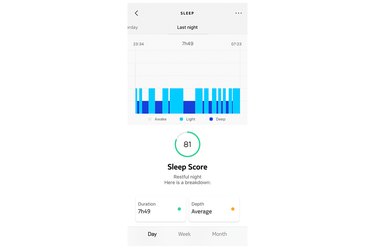
Sleep tracker apps rely on biological data to assess the quality of your shut-eye, so they typically require a wearable device in order to get an accurate reading. Health Mate comes with either a smart watch (starting at $55.96) or a sensor mat that you place on top of your mattress ($99.95).
"These devices measure your heart rate and movement during the night, and then create a composite of your sleep from the previous night," Dr. Winter says. The next day, you can check your "sleep score," derived from an algorithm that factors in sleep duration, depth and number of interruptions. The sensor mat also monitors your breathing patterns to detect potential sleep apnea.
Not only does Health Mate give you a snapshot of your sleep quality, but it helps users get on a sleep schedule by reminding you half an hour before bed that it's time to wind down, rating your progress at sticking to your target bedtime and revealing how long it took you to fall asleep so that you can be sure you're snoozing for the recommended 7 to 9 hours. In the morning, it will deliver a gentle vibrating alarm at the optimal point during your sleep cycle so that you'll wake up feeling refreshed instead of groggy.
"A consistent sleep schedule is especially important during quarantine and if you are working from home," Dr. Winter says.
In addition, Health Mate offers tools to pinpoint elements that might be influencing your sleep.
"You can look back at the last 30 nights and pick up on patterns," Dr. Winter says. "For example, you might find that you wake up more frequently if you drink alcohol before bed, or that you sleep better when you work out in the evening versus the morning." The app even offers suggestions to help you improve your sleep, based on your personal metrics.
Download it: Withings.com
- Rensselaer Polytechnic Institute Lighting Research Center: "New LRC Study Evaluates the Effectiveness of Apple's iPad Night Shift Application"
- SleepStandards: "Sleep habits post lockdown in the U.S. (2020)"
- National Sleep Foundation: "How Sleep Affects Your Immunity"
- American Sleep Association: "Snoring Apps to Help You Monitor Your Snoring"
- PLOS ONE: "Overnight polysomnography and the recording of sleep and sleep-related respiration in orchestra musicians – possible protective effects of wind instruments on respiration"
- Journal of Clinical Sleep Medicine: "Risk of Obstructive Sleep Apnea Lower in Double Reed Wind Musicians"
- Mattress Inquirer: "Squandered by Sleeping In: How Oversleeping Affects People"
- Journal of Caring Sciences: "Effect of White Noise on Sleep in Patients Admitted to a Coronary Care"
- JAMA Psychiatry: "Effect of Digital Cognitive Behavioral Therapy for Insomnia on Health, Psychological Well-being, and Sleep-Related Quality of Life: A Randomized Clinical Trial"
- National Sleep Foundation: "Sleep Hygiene"
Is this an emergency? If you are experiencing serious medical symptoms, please see the National Library of Medicine’s list of signs you need emergency medical attention or call 911.
